|
|
|
Sort Order |
|
|
|
Items / Page
|
|
|
|
|
|
|
| Srl | Item |
| 1 |
ID:
191955
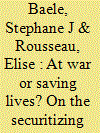

|
|
|
|
|
| Summary/Abstract |
This paper offers a multi-dimensional analysis of the ways and extent to which the US president and UK prime minister have securitized the Covid-19 pandemic in their public speeches. This assessment rests on, and illustrates the merits of, both an overdue theoretical consolidation of Securitization Theory’s (ST) conceptualization of securitizing language, and a new methodological blueprint for the study of ‘securitizing semantic repertoire’. Comparing and contrasting the two leaders’ respective securitizing semantic repertoires adopted in the early months of the coronavirus outbreak shows that securitizing language, while very limited, has been more intense in the UK, whose repertoire was structured by a biopolitical imperative to ‘save lives’ in contrast to the US repertoire centred on the ‘war’ metaphor.
|
|
|
|
|
|
|
|
|
|
|
|
|
|
|
|
| 2 |
ID:
159415
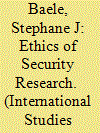

|
|
|
|
|
| Summary/Abstract |
Offering a framework for ethical assessment, this article draws attention to the ethical issues accompanying empirical research on security. Speaking to the various subfields and schools of broadly conceived applied security studies, we classify the many ethical issues specific to empirical research on security, conflict, and political violence into researcher-related problems, subject-related problems, and result-related problems. We evaluate the importance and variations of these issues and highlight potential mitigation pathways. This effort brings together an existing but fragmented literature and builds upon the authors’ own experiences in several subfields and schools of “hands-on” research on security and political violence.
|
|
|
|
|
|
|
|
|
|
|
|
|
|
|
|
| 3 |
ID:
157539
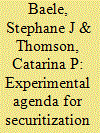

|
|
|
|
|
| Summary/Abstract |
Securitization theory has developed into a fruitful research program on the construction of security threats. The theory has experienced growing sophistication, and empirical studies have produced stimulating insights on issues as varied as the politics of immigration, health, climate change, or cybersecurity. Understanding how social issues become perceived as threats seems timelier than ever given the rise in securitizing narratives in recent political elections across the globe. We propose that this research agenda would benefit from broadening its methodological diversity. In particular, the use of experiments could complement existing methods in securitization theory, mitigate some of the program’s methodological weaknesses, and help explain when securitizing moves are likely to succeed or fail.
|
|
|
|
|
|
|
|
|
|
|
|
|
|
|
|
| 4 |
ID:
183029
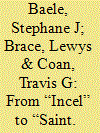

|
|
|
|
|
| Summary/Abstract |
This paper combines qualitative and quantitative content analysis to map and analyze the “Incel” worldview shared by members of a misogynistic online community ideologically linked to several recent acts of politically motivated violence, including Alek Minassian’s van attack in Toronto (2018) and Elliot Rodger’s school shooting in Isla Vista (2014). Specifically, the paper analyses how support and motivation for violence results from the particular structure this worldview presents in terms of social categories and causal narratives.
|
|
|
|
|
|
|
|
|
|
|
|
|
|
|
|
| 5 |
ID:
183699
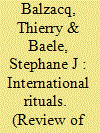

|
|
|
|
|
| Summary/Abstract |
The performance of ritual and the ritualisation of performance are the two main theoretical repertoires of ritual study in international politics and beyond. However, they also escalate tensions between those who insist on ritual's ability to operate by virtue of participants’ presence and those who believe that global networks of media call for a representational turn, which must tie participants and audiences across borders. Should we fail to understand how these distinct theoretical repertoires interact, it would be difficult to study international ritual, identify its functions, and trace its effects. Anchored in the sociology of ‘social occasions’, this article weaves ritual's patterns, properties, and resources into a coherent analytical framework. The framework enables us to better to grasp how actors move between/within different worlds (ritual and performance) and to what effects. The comparative study of two post-terrorism ritual occasions (the 2011 Rose March in Oslo and the 2015 Republican Marches in France) illustrates the usefulness of this theoretical proposition and its related framework.
|
|
|
|
|
|
|
|
|
|
|
|
|
|
|
|
| 6 |
ID:
181738
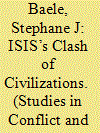

|
|
|
|
|
| Summary/Abstract |
Depictions of the West abound in the propaganda produced by the self-proclaimed “Islamic State,” presenting to potentially sympathetic audiences an overwhelmingly negative image of a supposedly homogeneous political entity. Combining quantitative and qualitative language and visual analysis, we systematically expose the various facets of this image and analyze the overall picture. Drawing on the “clash of civilizations” literature as well as on research on extremist language, we conceptualize this presentation of the West as a powerful radicalizing voice shaping today’s global civilizational politics.
|
|
|
|
|
|
|
|
|
|
|
|
|
|
|
|
| 7 |
ID:
157741
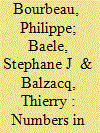

|
|
|
|
|
| Summary/Abstract |
The use of numbers has been remarkably effective at pressing global claims. While research has documented the historical processes through which numbers gained such prominence, and has examined the political and ethical consequences of this omnipresence, very little is known regarding the specific ways in which numbers create the outcomes that sustain governance. This article proposes to close that gap. Building on the literature that acknowledges that numbers not only describe things but also have profound impacts on things themselves, this article offers an integrated account of the working dynamics of numbers in the governance of security. To do so, the article identifies three distinct but connected vectors of power through which numbers shape security governance: persuasion, (de)politicisation, and standardisation. These insights are exemplified through the prism of different empirical examples, the variety of which aims to display the advantages of the approach we propose.
|
|
|
|
|
|
|
|
|
|
|
|
|
|
|
|
| 8 |
ID:
145991
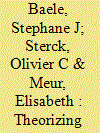

|
|
|
|
|
| Summary/Abstract |
While recent research has demonstrated the key role played by emotion in conflicts, the interplay between the individual and collective dimensions of this variable has not yet been fully conceptualized and satisfyingly measured. Focusing on the 2011 Palestinian statehood bid at the United Nations and the United Nations Educational, Scientific and Cultural Organization, this article highlights the circular character of group-based emotional dynamics and stresses the importance of “emotional worldviews” and “emotional configurations.” We subsequently provide an innovative, robust, and repeatable quantitative method for the direct measuring of these two components. This threefold contribution—theoretical, methodological, empirical—completes recent models (chiefly the appraisal-based framework) and unfolds new research avenues for the study of the role of individual and collective emotions in conflicts.
|
|
|
|
|
|
|
|
|
|
|
|
|
|
|
|
| 9 |
ID:
191540
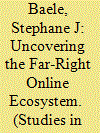

|
|
|
|
|
| Summary/Abstract |
Recent years have seen a substantial increase in far-right inspired attacks. In this context, the present article offers an analytical framework for the study of right-wing extremists’ multifaceted and fast-growing activity on the Internet. Specifically, we conceptualize the far-right online presence as a dynamic ecosystem, teasing out four major components that correspond to the different levels of analysis available to future research. We illustrate the benefits of this framework with key illustrative examples from the English-, French-, and German- speaking far-right, revealing the worrying size and breadth – but also heterogeneity – of today’s far-right online ecosystem.
|
|
|
|
|
|
|
|
|
|
|
|
|
|
|
|
| 10 |
ID:
165311
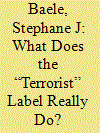

|
|
|
|
|
| Summary/Abstract |
Many scholars and practitioners claim that labeling groups or individuals as “terrorists” does not simply describe them but also shapes public attitudes, due to the label's important normative and political charge. Yet is there such a “terrorist label effect”? In view of surprisingly scant evidence, the present article evaluates whether or not the terrorist label—as well as the “Islamist” one—really impacts both the audience's perception of the security environment and its security policy preferences, and if yes, how and why. To do so, the article implements a randomized-controlled vignette experiment where participants (N = 481) first read one out of three press articles, each depicting a street shooting in the exact same way but labeling the author of the violence with a different category (“terrorist”/“shooter”/“Islamist”). Participants were then asked to report on both their perceptions and their policy preferences. This design reveals very strong effects of both the “terrorist” and “Islamist” categories on each dimension. These effects are analyzed through the lenses of social and cognitive psychology, in a way that interrogates the use of the terrorist category in society, the conflation of Islamism with terrorism, and the press and policymakers' lexical choices when reporting on political violence.
|
|
|
|
|
|
|
|
|
|
|
|
|
|
|
|
|
|
|
|
|